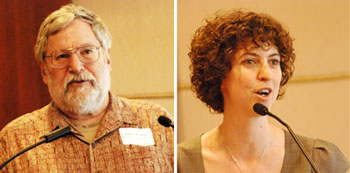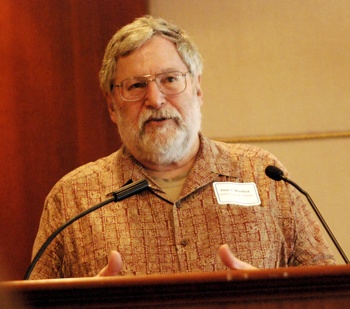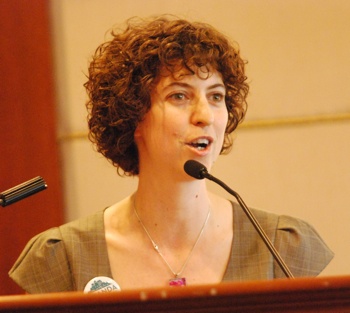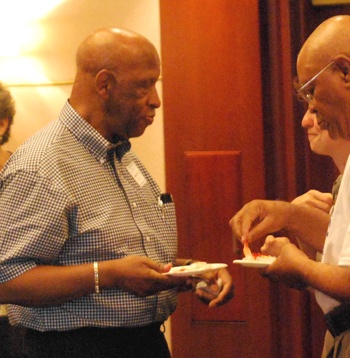Chamber Forum: Ypsilanti Mayoral Race
Two of the three candidates for Ypsilanti mayor – Democrats Amanda Edmonds and Peter Murdock – spoke to an audience of Ann Arbor/Ypsilanti Regional Chamber members on June 26, describing their vision for the city and answering questions.
Murdock, who currently serves on the Ypsilanti city council and was mayor of that city in the 1980s, talked about how Ypsilanti is still struggling with the “economic realities” of the Great Recession. The city needs more financial stability, and to help achieve that goal he supports efforts at collaboration – like Ypsilanti’s membership in the Ann Arbor Area Transportation Authority. He also talked about the need to quickly deal with eliminating debt on the city-owned Water Street property, which he called the “elephant in the room.”
Responding to questions from the audience, Murdock pointed to efforts to improve public safety through collaboration between the city, Eastern Michigan University, and the Washtenaw County sheriff’s office. “We’ll have more to say about that shortly, in terms of what we’re developing,” he said.
Edmonds is founder and executive director of the nonprofit Growing Hope, and serves as chair of the Ypsilanti Downtown Development Authority board. She described her vision for the city as one where residents and businesses thrive, not just survive. The mayor is the city’s chief ambassador, she said, setting the tone and bringing energy that attracts, retains and excites people to live, work, visit and play in Ypsilanti.
Her role as mayor would also entail building positive relationships with Ypsilanti’s neighbors, she said: “We have to put past differences behind us, and stop blaming, and find the common good.” Edmonds also talked about the importance of building a leadership “pipeline” through nominations to city boards and commissions, giving citizens an opportunity to serve and lead.
Responding to audience questions, Edmonds stressed the importance of public safety, but said the city needs to think more broadly about that issue – it’s not just about adding more police officers. Community involvement, community policing, and strong neighborhood associations are also important, addressing problems in a pro-active way. “We need to really think upstream about a lot of things, including public safety, to think about where those problems are, and how we bring the community together to solve them.”
This report includes written summaries of the Ypsilanti candidates’ responses, as well as audio clips from The Chronicle’s live broadcast of the event. The third candidate for Ypsilanti mayor, Democrat Tyrone Bridges, was not able to attend.
There are no Republicans running for mayor in Ypsilanti. The deadline for independent candidates to file petitions for the Nov. 4 election is July 17.
The June 26 forum also included the four mayoral candidates from Ann Arbor: Sabra Briere (Ward 1), Sally Petersen (Ward 2), Stephen Kunselman (Ward 3), and Christopher Taylor (Ward 3). Their remarks are covered in a separate article.
The June 26 event was held at the Ann Arbor Regent Hotel and moderated by chamber president Diane Keller, with audience questions moderated by Andy LaBarre, the chamber’s vice president of government affairs and administration. LaBarre also serves in elected office as a Washtenaw County commissioner. The event was followed by a mixer for chamber members and other candidates for local, state and federal offices.
Opening Statement: Peter Murdock
Murdock began by saying that he represents Ward 3 in the city of Ypsilanti, in his second consecutive term. In the past, he’s also served as mayor of Ypsilanti, he noted.
In the last five years, the city has spent a lot of time dealing with the economic realities of the Great Recession and the bursting of the housing bubble, which impacted Ypsilanti immensely, he said. The city government has shrunk in an attempt to balance its budget and provide the services that residents need. “We will continue to try to do that.”
As he looks to the future, Murdock said the same issues are still out there. The city needs some financial stability. Some problems are not unique to Ypsilanti, but some are. They have some legacy costs that they continue to try to deal with – they’ve addressed those in recent contract negotiations, but more needs to be done, he said. Services need to be consolidated. There needs to be some regionalization of services to provide those services in a better manner. They’ve done a lot of that over the last several years.
One good example is the expansion of the Ann Arbor Area Transportation Authority, which now includes Ypsilanti, Murdock said. Another example is the city’s new relationship regarding police services with Eastern Michigan University, the Washtenaw County sheriff’s office, and Ypsilanti Township. The city needs to build on that.
The elephant in the room, Murdock said, is the debt on the city-owned Water Street property. The city manager calls it the “albatross” that the city needs to deal with, he noted. “We need to deal with that fairly quickly in terms of marketing property for eliminating that debt.”
The other issue that Ypsilanti has, which probably isn’t unique to that city, he said, is public safety. The city isn’t going to attract businesses or residents if people have the perception – real or not – that the community is unsafe. They need to build on the restructuring of the police department, under its new chief and almost an entire new command structure, and a staffing level that’s finally built back up better than it was – although not necessarily what it should be, he said. They need to build the city’s community policing, and bring back a downtown officer on the beat.
Another issue is transportation. That’s always been key to Ypsilanti’s economic development, Murdock said – whether it’s the Sauk Trail, the Huron River, the railroad, Chicago road, or Willow Run airport. It’s always been transportation that’s allowed the Ypsilanti business community to thrive. That’s still important, but they’ve gone beyond that, he said. They need a broader transportation system that serves a wider community, and that’s efficient and effective. That’s why it was important to expand the Ann Arbor Area Transportation Authority.
The commuter rail proposal between Jackson, Ann Arbor and Detroit will be another important element in Ypsilanti’s development, Murdock said, and create a corridor between those communities. It will help the housing market and economic development in Ypsilanti. Transportation isn’t just about cars anymore, he noted – it includes bikes and walking too. The city has developed a non-motorized plan, and a new city master plan is keying in on making the community more walkable, because that attracts more people.
Sustainability is also important, Murdock said. All of the things that the city does should have a focus on making the community more sustainable. The city has adopted a sustainability plan and is starting to implement it as finances become available and opportunities occur. They’ve partnered with the Michigan Suburbs Alliance on better energy-efficiency for buildings. Energy audits have been conducted on all the public buildings, and this summer the final set of streetlights will be converted to LEDs. He noted that the city also established an energy revolving loan fund for energy-efficiency work.
Q&A with Murdock
Two questions were posed to Murdock, on public safety and education.
Question (asked by a Washtenaw Community College student): Many of my classmates will be transferring to Eastern Michigan University. They’re concerned about security issues on campus. Is there any strategy to communicate with those students, to tell them that the city is going to improve safety?
Murdock: The city has been working with EMU, the sheriff’s office and Ypsilanti Township, trying to deal with these issues, he said. “We’ll have more to say about that shortly, in terms of what we’re developing,” he said. EMU and the city of Ypsilanti have both hired more police officers. The apartment buildings next to campus have also been improving security, he said. The university is working to notify people in the community about various efforts that are underway.
Question: In a lot of communities across the country, many mayors are actively involved in trying to support education and school districts. What ideas do you have in terms of being an active participant or trying to create a partnership between the mayor’s office and the school district. As you well know, the Ypsilanti public school district recently consolidated with the Willow Run district, and at one point there was a partnership effort between the local school district and the mayor’s office. Do you see that as a viable option or major interest of yours, to try to support education by creating such a partnership?
Murdock: The public school system is a key element and is important to any community – Ypsilanti is no different, he said. There’ve been issues in the school district, the consolidation is here and there are a lot of good things happening that need to be supported. He didn’t know what form a partnership might take, “but we certainly have to be supportive of [the schools]. We have to partners in the education system for the residents of our community.”
[.mp3 of Peter Murdock's remarks and answers]
Opening Statement: Amanda Edmonds
Amanda Edmonds said she’s excited about Ypsilanti’s future. The city faces some serious economic challenges, but her vision for Ypsilanti moving forward isn’t just about surviving – it’s about the city thriving in the future.
Ypsilanti has an incredible energy, Edmonds said. Walking down Michigan Avenue or walking along Cross Street reveals entrepreneurs who are excited to start new businesses, as well as anchor businesses ready to expand their reach. Whether it’s Michigan cider from Red Rock, a painting by an Ypsilanti artist at The Eyrie, fresh tacos from Dos Hermanos, shoes from Puffer Reds, Haab’s legendary fried chicken, or a weekly haircut, “it’s our diversity of small businesses that not only lay this economic foundation for our community, but weave the cultural fabric that makes it a place that I love to live and work.”
The question is what comes next, she said – how can they shape a vision for the community that’s both realistic and optimistic?
Her approach involves attracting people, investment, energy and ideas into the community. Growing the local economy means attracting and retaining investment, talent and residents. As chair of the Ypsilanti Downtown Development Authority, she’s been working to bring business and community voices to the table to create a concrete vision of a more livable, walkable and inviting community, she said. She’s helped streamline the DDA governance so that it can function both efficiently and respectfully, to focus on the good work of improving the community.
As mayor, Edmonds said she’d focus on economic development through local ownership, making Ypsilanti a model sustainable city, embracing and celebrating the diversity that makes the city strong. It means supporting the existing local businesses, making sure that they can stay and grow in the community. It also means being pro-active, seeking out and recruiting businesses that are good employers and strong community citizens, she said, that are invested as much in the community’s success as in their own success.
As founder and executive director of Growing Hope, Edmonds said she knows what it means to make payroll, to set policy, to operate with limited resources – and all the other pieces it takes to run a business. As mayor, she’d bring that experience to the council chambers.
The city can never forget that one in four citizens live below the poverty line, Edmonds said. “We only thrive as a community when every one of our citizens thrive.” She’s worked in every neighborhood in the community, and there are real disparities. Those disparities must be addressed. That means supporting employers that pay living wages, finding jobs for teens in the summer, ensuring that everyone has quality housing, safe neighborhoods, and good food. “These are all essential to our community thriving.”
Edmonds described three roles that the mayor plays for Ypsilanti. The mayor is the city’s chief ambassador, representing residents both in the community, with the city’s neighbors, and within the region. “My strength is in being that positive ambassador for Ypsi,” she said. It’s a role she already plays as executive director of Growing Hope, and when serving on regional, state and national boards and councils, and as she travels across the country as a speaker and trainer. This kind of ambassador sets the tone and brings energy that attracts, retains and excites people to live, work, visit and play in Ypsilanti.
Secondly, a mayor facilitates partnerships and positive relationships with Ypsilanti’s neighbors, because “we really only win when we all win,” she said. Her approach to working with Ypsilanti Township, EMU, the public school system, Washtenaw Community College, county government, Ann Arbor and others is to really invest in each other’s success. “We have to put past differences behind us, and stop blaming, and find the common good. All I say, every day, is all we can do is move forward. No more blaming.”
Finally, a great honor and responsibility of the mayor is building leadership, she said. The mayor nominates appointments to city boards and commissions, and through this gives an opportunity for citizens to serve and lead. “I take that really seriously, and I’m committed to ensuring that voices at the table represent our entire community.” She’d work to build those pipelines of leadership, particularly so that those who haven’t been asked or given the opportunity to serve or have a place at the table are invited to do so.
Edmonds said she’s excited about the possibility that the electorate will allow her to serve the community in this new way. “I look forward to both the challenge and the honor.”
Q&A with Edmonds
Edmonds fielded three questions, focused on a city income tax, public safety, and reasons why young professionals are reluctant to move to Ypsilanti.
Question: Like many municipalities across the country, Ypsilanti is facing rather significant financial difficulties. The current mayor and city council have done a lot to try to balance the budget. Several years ago, former mayor Cheryl Farmer appointed a commission to study city finances. The primary recommendation was a city income tax. Are you an advocate of supporting an income tax as a means to generate additional revenues to support Ypsilanti?
Edmonds: This issue has gone before the voters, she noted. The voters said no, “so while it is an option in the world, it’s not a viable option and is not what our community has said.” It’s not something she’d work to move forward.
Question: A year or so ago, the Southeast Michigan Council of Governments (SEMCOG) did a report on the city of Ypsilanti and its financial situation. If you’re familiar with that, what do you think is the biggest valid concern that was raised?
By way of background, the report was commissioned by city manager Ralph Lange and completed in December 2012. It was included as part of the Ypsilanti city council’s special meeting packet for Jan. 3, 2013. [.pdf of SEMCOG report]
Edmonds: She’d heard about the report, but wasn’t familiar with it and hasn’t read it. She asked if the question could be reframed in a way so that she could address the question.
Follow-up: Public safety was one of the main issues in the report. In the wake of that, there was a big discussion about creating a hybrid police and fire force, but that didn’t move forward. One of the suggestions was to try to utilize the 30 or so officers on EMU’s force. What type of collaboration might be possible for that – to get more police on the street while reducing overtime?
Edmonds: The city council, Rep. David Rutledge, the county sheriff and others have been working on collaboration between the city, EMU and the sheriff’s office. She’s excited about that and wants to move it forward. “We need to always prioritize police and public safety in our budget.” But it’s important to think about another level as well, she said. If public safety is only coming to light when there’s a headline in the news about tragic and terrible events, or when someone is making a call for police response, “then we’re thinking about it way too late.”
The city needs to think about public safety beyond the number of police officers. Community involvement, community policing, and strong neighborhood associations are important. Also important are how communities are designed, and how the city’s priorities in replacing infrastructure are hindering or helping public safety. “We need to really think upstream about a lot of things, including public safety, to think about where those problems are, and how we bring the community together to solve them.”
Question: At the beginning of this year, I started running a small company in Ypsilanti, with 50 employees and $15 million in revenues. But I can’t convince my wife to move to Ypsilanti with our three kids. What do you think are the things holding her back that stops professionals from wanting to live in Ypsilanti?
Edmonds: A couple of things hold people back, and it’s in part about reputation. Some of those things – the challenges that are in the media or in people’s minds or people’s past perceptions – are real, and many of them are false. “We feel like when we can bring people into the community and hang out and spend time, people have a whole different understanding.” That’s part of a mayor’s role to set that tone and be an ambassador.
That’s also why she talks about regionalism and partnerships, and why she says that “we all win when we all win,” Edmonds said. “Ypsilanti could be, in the city limits, the safest community in this state. And if Ypsilanti Township has crime challenges, the headline still reads ‘Ypsilanti.’” So the city needs to think beyond its borders, because if the surrounding townships still have challenges, then the city’s reputation will also suffer.
Edmonds also said the public schools are a real barrier for many people who have school-age children or who plan to start families. Although the mayor doesn’t have any direct control over the schools, the role of the mayor as an ambassador is to spread the word about good things going on in the schools. It’s a rocky time, post-consolidation, she said, but as she campaigns door-to-door she’s telling people about New Tech High School and project-based learning and the Montessori kindergarten option. “I’m finding that many people don’t know that, so whether or not we have kids in the schools, it is all of our jobs to support the schools.”
She cited the work of church leaders, who are walking the halls of the high school and being extra feet on the street. Edmonds said she’s a proud graduate of a public school that had many of the same challenges as Ypsilanti, “and I wouldn’t have changed my education for anything.” People need to send their kids to the public schools and take a chance, and to invest in the schools as community members, she said.
[.mp3 of Amanda Edmonds' remarks and answers]
The Chronicle could not survive without regular voluntary subscriptions to support our coverage of local government. Click this link for details: Subscribe to The Chronicle. And if you’re already supporting us, please encourage your friends, neighbors and colleagues to help support The Chronicle, too!







